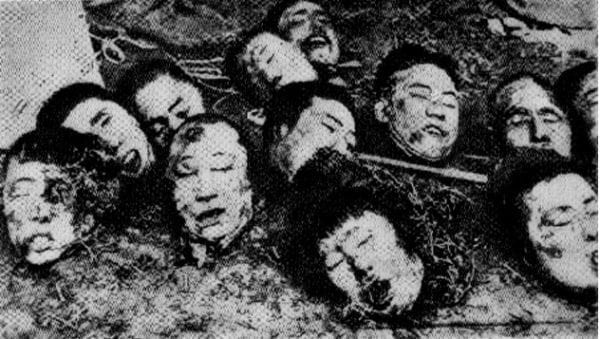North Korea again a danger to US. Start trembling!
Donald Trump’s DoD chief’s trip to Seoul and the ensuing, customary saber-rattling against North Korea prompted our reposting of an excellent piece by John LaForge on the same topic. The essay is preceded by an editorial annotation focusing on the unchanging evil nature of US foreign policy.
Reviewing the essays written over the years by critics of US foreign policy, one thing stands out immediately: the obstinate sameness and continuity of America’s warmongering against enemies big and small, most of them manufactured by America itself (or imagined). Indeed, except for very brief interludes, America has been continually at war since its inception.
Why is there no change or let up in this invariably horrendous script, equal parts high-handed hypocrisy and arrogant sanctimoniousness, and always lavishly buttressed by jingoist exceptionalism and the most outrageous fabrications? The only rational answer is that US foreign policy is not so much a true adaptive and honorable response to changing world events in an effort to safeguard the authentic national interest, but the playing out of American capitalism’s sordid quest for global supremacy, a project that inevitably implies enormous imperial crimes that benefit no one but a puny plutocratic minority in control of the US government.
Since few people would be willing to spill their blood or allow the national treasure to be plundered for such ignoble purposes, none of this colossal scam is possible without the aid of American imperialism’s numerous self-serving myths so reliably served by its ideological outgrowth, the corporate controlled media, easily the most devious propaganda machine ever seen in history. Unfortunately, although it’s clear the mainstream media is losing traction in its ability to sell lies with impunity, relief from this imposture does not appear possible in the near future. Thus, as is the case with US foreign policy, which recognizes only force, never morality, and which, as a curse on humanity will not be stopped until the vampire system that engenders it is eliminated, the prostitution of the American media—from its ostensible “entertainment” sector to its so-called “news” programmes—will not disappear until corporate power itself, and its venomous influence on mass communications, is broken.
Many well-intentioned people wonder how this ludicrously malevolent state of affairs came to be. The explanation is mundane. In most cases, the widespread collaboration of American media figures with the imperial lies issues not so much from harsh coercion, as in an openly despotic regime, but from simple selfish careerism and self-preservation, selfishness being a well-entrenched and even admired “virtue” in the upside down world of US capitalist values. Says Paul Street, sagely, in a recent piece:
American “mainstream” journalists who want to keep their paychecks flowing and their status afloat know they must report current events in a way that respects the taboo status of the nation’s underlying inequality and oppression structures and its savage and relentless imperial criminality. Those topics are understood as off limits, as beyond the narrow parameters of acceptable and polite discussion. They are subjects that serious reporters and commentators have the deeply indoctrinated common sense to avoid.
That such careerism causes the death of untold millions and the destruction of the planet’s essential ecosystems and quite possibly its incineration in an imbecilic nuclear war is apparently a bargain most Western journalists are quite prepared to tolerate.
The above is aggravated by the epidemic of complacent ignorance and unquestioned belief in the national mythology we observe among mainstream journalists, regardless of social background. Thus, while many who hail from small-town “patriotic” America, folks like Dan Rather and Charlie Rose, two prominent CBS “journalists”, are apparently proud to put what they perceive as their patriotic duty (as dictated by the State Dept.) above truth or fairness, their Ivy League, Big City colleagues are scarcely exempt from the same vice.
Confronted and clearly exasperated with this universe of pseudo-facts and decontextualized news fueling the incorrigibly vile nature of US foreign policy, John Gerassi, himself a former journalist, fired the following evaluation:
A great deal is being written in America these days about Pax Americana and American hegemony in the underdeveloped world. No longer able to blot out the obvious, even calm, rational, conscientious academicians are publicly lamenting America’s increasingly bellicose policies from Vietnam to the Dominican Republic. Suddenly, as if awakened from a technicolor dream, intellectuals are discovering such words as “imperialism” and “expansionism.” And they are asking: Why? Who’s to blame? What can be done to stop all this?
The questions are childish, the assumptions false, the implications naïve. They reflect a liberal point of view, one that claims that there is a qualitative difference between U.S. policies today and yesterday. In fact, American foreign policy has varied only in degree, not in kind. It has been cohesive, coherent, and consistent. What has varied has been its strength—and its critics.
The basic difference between American imperialism today and American imperialism a century ago is that it is more violent, more far-reaching, and more carefully planned today. But American foreign policy, at least since 1823, has always been assertive, always expansionist, always imperialist. Of course, it has rarely been pushed beyond America’s capabilities. Thus, when the United States was weak, its interventions abroad were mild. When its strength grew, so did its daring. Today, as the most powerful nation on earth, with a technological advance over other countries of mammoth proportions, the United States can be imperialistic on all continents with relative security. (John Gerassi, Violence, Revolution, and Structural Change in Latin America).
Gerassi wrote this assessment in the early 1960s. Plus ça change, uh?
Salvador de Madariaga, a liberal and cynic of the old school, quoted in the same piece by Gerassi, was also struck by the robotic course of US foreign policy. His explanation found the roots of the phenomenon in native capitalism’s sacralization of American foreign policy. Consistent with this view, Madariaga argued that American foreign policy cannot be questioned because it is no so much a policy as a religious tenet: the dogma of the infallibility of the American President and the dogma of the immaculate conception of American foreign policy. The illustrious de Madariaga gave us his opinion in the 1930s.
CONCLUSION
In the excellent essay reproduced below by John LaForge, first published in January of 2016, we see, once again, the malignant reality of US exceptionalist foreign, cynically piling up threats and quite possible a huge deal of pain on a small nation the United States has tortured for well over half a century, all the while pushing the world ever closer to a tragic conflagration. For obvious reasons, now that Donald Trump’s own military emissary, Secretary for War Gen. James Mattis, has flown to South Korea to issue the usual carefully choreographed “assurances of support” by the US against some manufactured threat, we find LaForge’s essay all the more compelling. Hence this repost.
It bears repeating: None of this revolting cowardice and ugliness will stop until the American people see through this carefully maintained claptrap and dismantle the vicious empire behind it, to the last toxic brick. One can only hope that if that great day ever comes, those who have plotted and committed so many crimes against humanity, and nature itself, will be arraigned before a Nuremberg-type tribunal and dealt swift justice. I should think that, for the sake of fairness and comprehensiveness, that judgment will also should include their virtual army of media flacks and accomplices.
Meanwhile, as long as we have a supremacist capitalism at the helm of America’s ship of state we’ll have a sociopathic foreign policy.
—P. Greanville
The US Tiger and the North Korean Mouse
Dateline for this photo: Feb. 1, 2017. Gen. Mattis in South Korea issuing threats against the North, and justifying the THAAD nuclear de-stabilizing system aimed at China and Russia, and not Pyongyang, as claimed. [dropcap]N[/dropcap]orth Korea’s claim to have conducted a hydrogen bomb test January 5 has been both ridiculed as completely implausible and condemned from all sides as provocative and a violation of UN Security Council Resolutions. Without any hard evidence that North Korea has a single H-bomb, official “concern” needs to be manufactured if our weapons contractors are to stay in business. We could expect to hear Senator Bob Corker, R-Tenn., chairman of the Senate Foreign Relations Committee, chant that he wants the US “to take a more assertive role in addressing North Korea’s provocation.” But Anna Fifield, the Washington Post Bureau Chief in Tokyo who should be an impartial observer, wrote Jan. 6 that the underground test was a “brazen provocation and a clear defiance of international treaties.” She later told National Public Radio that she wouldn’t want to speculate about what motivated the North’s President Kim Jong Un, because the inside of his head “is a scary place.” The interviewer let this assertion go unchallenged. North Korea is such a military, economic and political nothing, that it’s astounding to see the national media parrot official Pentagon and State Department fear-mongering about its patently obvious and unquestionably terrible intentions. When was the last time North Korea bombed, invaded, militarily occupied, or installed puppet regimes in other lands? Those provocatively brazen violations of international treaties were committed by … the United States of America. When has North Korea placed 5,000-man, 60-aircraft “super carriers” (the largest ships in the world) in the Persian Gulf and attacked Yemen, Pakistan, Somalia, Iraq, Libya, Syria and Afghanistan using Reaper drones and jet fighter-bombers? Oh right; that was the North Americans. In 1999, US-led NATO air forces bombed Serbia and Kosovo for 78 days. That wasn’t long after US cruise missile attacks on Sudan and Afghanistan — which in turn barely followed Clinton’s 1998 Christmas-time bombing of Iraq. That of course was only an intensification of the ongoing carrier-based campaign of bombing Iraq two or three times every week for 12 years from 1991 to 2003 — when under false pretenses the Bush/Cheney horror went viral with extreme prejudice. At least 370,000 civilian deaths can be blamed on the 1991 (Bush I) and 2003 (Bush II) US wars on Iraq. In October 2001, the Air Force and Navy returned to bombing and rocketing Afghanistan, eventually toppling the government and occupying the country. Now with the private contractors and hand-picked presidents having turned Iraq into a failed police state, it is easy to see how the global public, when polled, declares the United States the most dangerous country on earth. I haven’t forgotten that in 2003 protesters in nearly every capital city carried posters depicting the US president as a “Most Wanted” fugitive from justice, a war criminal and a danger to world order. What a relief that Barak Obama has a Peace Prize with which to conduct indiscriminate warfare, torturous force-feeding of hunger strikers, and indefinite detention of suspects without charges just like his predecessors. [dropcap]B[/dropcap]ut forget the opinion of the world’s 95 percent, the Mpls. Star Tribune reported without attribution that, “US military planners view [North Korea] as the world’s most dangerous state.” With two-thirds the population of California, no oil, and having endured in the mid-1990s a famine that killed one-tenth of its population, North Korea is certainly more threatening than the US which has military bases in more than 100 countries, 10 aircraft carriers (Russia and China each have 1), and 14 ballistic missile submarines. According to US intelligence services, North Korea is suspected of having perhaps two nuclear weapons and an annual military budget of $7.5 billion in 2014. The US’s roughly $600 billion Pentagon allotment [admitted budget, real one a secret] includes 4,000 nuclear warheads on alert. Any one of the (eight) Trident subs that the US Navy keeps in the Pacific is capable of burning down the entire Korean landmass. Even if North Korea had a rocket that could aim straight, what could it expect to gain by attacking South Korea or Japan? This central question is never asked, much less answered, by the screamers on FOX, the Senators from Lockheed-Martin, or the Representatives from Northrop-Grumman. If the illogic sounds familiar, it is. There was never an answer to the question: Why would the USSR attack Western Europe or the United States during the Cold War? What the Soviets would have gained by attacking, and what North Korea could achieve with aggression, is obvious: Absolutely nothing — beyond self-destruction. With luck, the US tiger will just hold its breath and tremble at the mousey shadow of North Korea, which never stops provoking. A few years ago it had the nerve to ask the White House for a promise that it won’t be preemptively attacked. John LaForge is on the Nukewatch staff and edits its Quarterly.
A danger to the world?














 Philosopher, novelist, filmmaker and investigative journalist. He covered wars and conflicts in dozens of countries. His latest books are: “
Philosopher, novelist, filmmaker and investigative journalist. He covered wars and conflicts in dozens of countries. His latest books are: “